Our Work
Founded in 2014, the Center on Privacy & Technology is a leader at the intersection of privacy, surveillance, and civil rights.
Latest Work
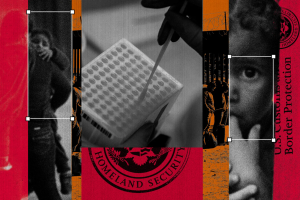
Privacy Center quoted in WIRED article about CBP’s DNA collection program
Director of Research and Advocacy Stevie Glaberson was quoted in a WIRED article about CBP's DNA collection program. "Taking DNA from a 4-year old and adding it into CODIS flies in the face of any immigration purpose. That’s not immigration enforcement. That’s genetic surveillance,”said Glaberson. The article also cited the Center on Privacy & Technology's 2024 report "Raiding the Genome."
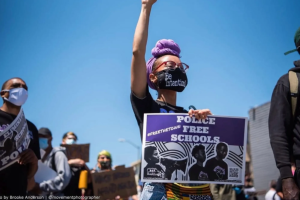
Privacy Center quoted in Word In Black piece about school policing
Privacy Center Senior Associate Clarence Okoh was quoted in a Word In Black article titled “The Truth About School Policing.” “The consequences of policing, whether through surveillance or physical presence, yield the same outcomes. Students still face contact with the criminal legal system — it just may happen through a screen now instead of in the hallway,” said Okoh.
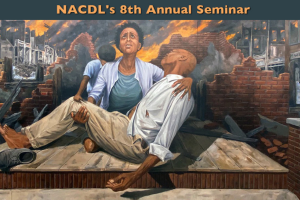
Privacy Center at 2025 Race Matters Seminar
Senior Associate Clarence Okoh taught at the 2025 Race Matters Seminar hosted by the National Association of Criminal Defense Lawyers in Tulsa, OK. Okoh taught a program titled "Watched Youth: Challenging Surveillane Technology that Criminalize Youth and Young Adults."
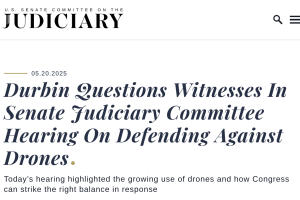
Testimony before Senate Judiciary Committee by Privacy Center Faculty Director
Faculty Director Laura Donohue testified during a Senate Judiciary Committee hearing entitled "Defending Against Drones: Setting Safeguards for Counter Unmanned Aircraft Systems Authorities." Donohue spoke of the balance of protecting privacy and civil liberties, as well as security, when using unmanned aircraft systems. She also noted that the way to balance civil liberties concerns is to make sure there are restrictions.
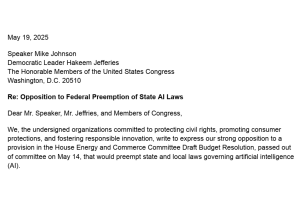
Privacy Center signs on to letter opposing the “big beautiful bill”
The Privacy Center joined a diverse coalition of organizations in signing on to a letter opposing the proposal in House Republicans "big beautiful bill" (funding package) that would bar state enforcement of regulation pertaining to AI or automated decisionmaking tools for a decade. The letter was drafted by Demand Progress. Other signatories included Cornell University, Public Citizen, the Innocence Project, Southern Poverty Law Center, worker organizing groups from Alphabet and Amazon, and many more. The moratorium advocacy worked--the provision was removed from the final bill.
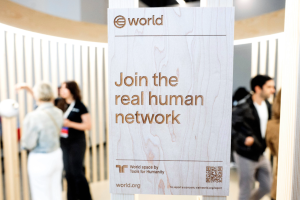
“Sam Altman’s World: Sometimes Things Are Just What They Seem to Be” Article in Tech Policy Press
Privacy Center Executive Director, Emily Tucker, co-authored a piece in Tech Policy Press with philosopher David McNeill, warning of the dangers of Sam Altman’s new Tools for Humanity technology. Sam Altman is “nothing special,” they say. “He is the kind of person who inevitably rises in an extractivist economic system that transparently rewards those who show contempt for laws, regulations, and the people who enact them.”

Three year anniversary of “American Dragnet”
Three years ago, we released our report “American Dragnet: Data-Driven Deportation in the 21st Century,” a two-year investigation into the sweeping surveillance powers of the U.S. Immigration and Customs Enforcement (ICE). What we found is that ICE surveillance is much broader than people realize – it’s a dragnet. Their tactics include: using facial recognition to search 1 in 3 drivers, accessing the driver’s license records of 3 in 4 adults, and accessing the utility records of 3 in 4 adults. The report describes the surveillance apparatus that Trump is using to target immigrants, activists and anyone else who challenges his agenda. We’re re-releasing it today with a new foreword. Today, those powers are wielded by an increasingly authoritarian regime. Given the second Trump administration’s disregard for privacy and civil rights protections, the percentage of people now watched is likely much higher. Under the guise of immigration enforcement, the new administration has begun to grow its already massive digital infrastructure, aggregating data across federal agencies and destroying crucial privacy guardrails in the process. We don’t know how far the administration will go in testing the limits of its powers. But what’s clear is that the struggles for immigrant justice, free speech, and privacy are interconnected, and that building solidarity is more crucial than ever.
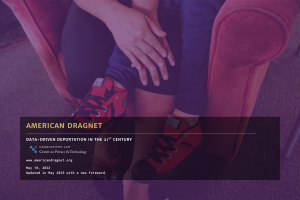
Center on Privacy & Technology at Georgetown Re-Releases 2022 Report on ICE Dragnet Surveillance Practices
The Center on Privacy & Technology at Georgetown Law re-released “American Dragnet: Data-Driven Deportation in the 21st Century,” with a new foreword in May 2025. The 2022 report was the first to quantify the scope of the surveillance operations being carried out by the federal government through Immigration and Customs Enforcement (ICE). Today, the Trump administration is using the digital surveillance apparatus the report describes to target immigrants, activists and anyone else who challenges his agenda. Emily Tucker, the Privacy Center’s Executive Director said, “Mass surveillance is fundamentally incompatible with democratic self-governance. The danger of ICE’s data dragnet is not only that individual people will be targeted, but that our ability to act together as a people will be permanently undermined.” The full press advisory is available at this link.
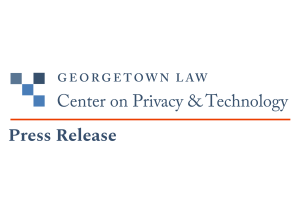
Privacy Center Re-Releases 2022 Report on ICE Dragnet Surveillance Practices
The Privacy Center re-released "American Dragnet: Data Driven Deportation in the 21st Century," the first report to quantify the sweeping surveillance power of U.S. Immigrations and Customs Enforcement (ICE). A new foreword situates the findings against the backdrop of ICE's expansive surveillance powers in the control of an increasingly authoritarian regime. Read the full press advisory.

Privacy Center quoted in Word In Black piece about youth surveillance
Privacy Center Senior Associate Clarence Okoh was quoted in a Word In Black article titled “Black Students Are Being Watched Under AI — and They Know It.” “The most insidious aspect of youth surveillance in schools is how it deepens and expands the presence of law enforcement in ways that were previously impossible,” said Okoh.
